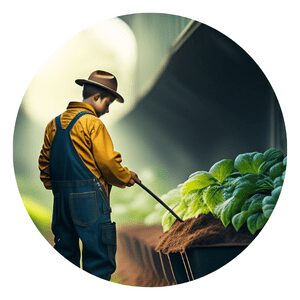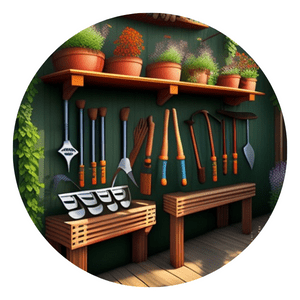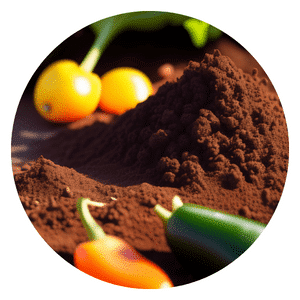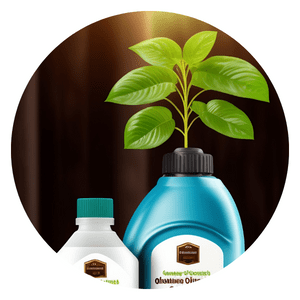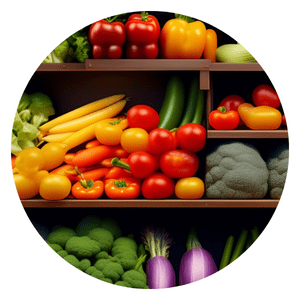What Is The Best Organic Fertilizer For All Plants?
Imagine walking through a garden that seems plucked straight out of paradise – lush foliage, vivid blossoms, and fruits so abundant they practically beg you to take a bite.
Now picture achieving such an awe-inspiring sight in your own backyard with the help of the best organic fertilizer for all plants.
Whether you’re an experienced gardener seeking natural alternatives or just starting on your green thumb journey, this article is here to unveil the key ingredients that Mother Nature has designed specifically for fueling plant growth and vitality.
Prepare yourself for a deep dive into the realm of organic fertilizers – where science meets sustainability and yields flourish like never before!
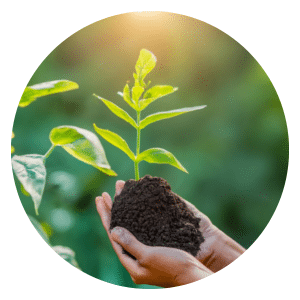
Best Organic Fertilizer Menu
Compost
When it comes to organic fertilizers, one of the best options available is compost.
Compost can be made at home or purchased commercially, both providing excellent benefits for plants and soil health.
Homemade compost allows you to take control of the entire process, using kitchen scraps, yard waste, and other organic materials to create a nutrient-rich fertilizer tailored specifically to your garden’s needs.
On the other hand, commercially available compost offers convenience and consistency in terms of nutrient content.
Regardless of whether you choose homemade or commercially available compost, both options enrich the soil with a wide range of essential nutrients.
From nitrogen and phosphorus to potassium and micronutrients, compost provides a balanced blend that promotes healthy plant growth. This all-purpose organic fertilizer also improves soil structure by enhancing water retention and drainage capabilities while reducing soil erosion.
Plus, as it releases nutrients slowly over time, it helps maintain steady levels in the soil without causing nutrient imbalances or leaching.
While some may argue that homemade compost offers more varied nutrients compared to commercial products due to diverse input materials, it’s important not to overlook the potential risks associated with pathogens and weed seeds in unregulated homemade composts.
Commercially available composts undergo strict quality control processes that ensure they are free from contaminants while maintaining consistent nutrient levels. This is particularly advantageous for those who don’t have the time or resources to produce their own compost.
Well-Aged Manure
Well-aged manure is like gold for organic gardeners. Not only does it provide a rich source of essential nutrients, but it also improves soil structure and fertility.
Organic manure, such as composted cow, horse, or poultry manure, contains high levels of nitrogen, phosphorus, and potassium.
Nitrogen is crucial for leafy growth and green foliage, while phosphorus promotes strong root development and flowering. Potassium helps plants withstand disease and stress.
Apart from its nutrient content, well-aged manure has another advantage over synthetic fertilizers – it is slow-release. This means that the nutrients are released slowly over time as the organic matter decomposes in the soil.
As a result, plants receive a steady supply of nutrients throughout their growth cycle rather than experiencing sudden surges that can lead to excessive vegetative growth or nutrient deficiencies.
Using well-aged manure can also improve soil health by increasing its ability to retain moisture and enhance beneficial microbial activity.
The presence of organic matter boosts soil structure by improving its ability to hold water while preventing compaction. This allows roots to penetrate easily into the ground while ensuring that excess water drains properly.
Fish Emulsion
Derived from fish waste, fish emulsion is a liquid fertilizer that is high in nutrients like nitrogen and phosphorus. This makes it a suitable choice for both soil and foliar application.
What sets fish emulsion apart from other organic fertilizers is its unique composition.
Unlike other natural fertilizers, it contains a wide range of essential amino acids that are readily absorbed by plants, giving them an extra boost to grow vigorously.
Another advantage of using fish emulsion as an organic fertilizer is its ability to improve soil fertility. The high levels of nitrogen help promote the growth of beneficial microbes in the soil, which in turn enhances nutrient availability for plants.
Additionally, the phosphorus content aids in root development and helps plants establish themselves more effectively.
In terms of foliar application, fish emulsion provides a quick and efficient way to deliver nutrients directly to the plant leaves. This can be especially beneficial for plants that are showing signs of nutrient deficiencies or those with limited access to nutrients due to poor soil conditions.
By simply spraying the diluted solution onto the plant foliage, you can ensure that your plants receive an instant supply of vital elements to support their overall health and growth.
In the realm of green and lush domains, Where nature reigns and growth sustains, There lies a secret in soil's embrace, The best fertilizer for plant's grace. Organic whispers dance on gentle breeze, From compost's wealth to manure's ease. With love and care, their nourishment pure, All plants thrive, their beauty secure.
Chappy The Gardener
Bone Meal
One of the best organic fertilizers for promoting root development and flowering in plants is bone meal.
Bone meal is derived from the bones of animals, usually cattle or fish, and it is rich in phosphorus and calcium. These nutrients are essential for plant growth, as phosphorus plays a crucial role in energy transfer and cell division, while calcium aids in the development of strong roots.
What sets bone meal apart from other fertilizers is its slow-release nature.
Unlike synthetic fertilizers that release nutrients quickly but can also cause nutrient burn if not used correctly, bone meal provides a steady supply of nutrients over time. This allows plants to absorb the necessary compounds at their own pace, resulting in healthier root systems and more vibrant flowers.
While bone meal is beneficial for a wide range of plants, it is particularly useful for flowering plants such as roses and tulips.
Its high phosphorus content helps encourage the production of large, colorful blooms, making it an ideal fertilizer choice for gardeners who want to enhance their flower beds or add some pizzazz to their landscaping.
Blood Meal
Blood meal is a lesser-known organic fertilizer that can work wonders for your plants.
Derived from dried animal blood, it is an excellent source of nitrogen, which is crucial for plant growth. Nitrogen promotes the development of lush, green foliage and encourages the production of chlorophyll, essential for photosynthesis.
Leafy vegetables like lettuce, spinach, and kale benefit greatly from blood meal as it provides them with the necessary nutrients to grow quickly and abundantly.
One unique advantage of using blood meal as a fertilizer is its quick release nature.
Unlike some other organic fertilizers that take time to break down and release their nutrients, blood meal acts almost immediately upon application. This rapid absorption ensures that your plants receive an instant boost of nitrogen, allowing them to show visible signs of improvement in just a matter of days.
For gardeners looking to achieve vibrant and healthy leafy greens in a short span of time, incorporating blood meal into their fertilization routine can yield impressive results.
However, it’s important to note that blood meal should be used sparingly and with caution due to its high nitrogen content.
Over-application can lead to nutrient burn or excessive vegetative growth at the expense of fruiting or flowering. It’s recommended to follow the package instructions or consult with a gardening expert to determine the appropriate usage for your specific plants.
Seaweed/Kelp Meal
Seaweed and kelp meal may not be the first thing that comes to mind when you think of plant fertilizers, but these natural wonders pack a powerful punch.
Seaweed and kelp are rich sources of micronutrients such as iron, zinc, manganese, and potassium. These vital elements play crucial roles in plant health by promoting root development, improving nutrient uptake, and enhancing overall growth.
But it doesn’t stop there – seaweed and kelp meal also contain a wide range of growth hormones like auxins and cytokinins. These hormones regulate key physiological processes in plants such as cell division, root elongation, and flowering.
By providing these growth hormones naturally through organic fertilizer options like seaweed and kelp meal, you can give your plants a boost without resorting to synthetic chemicals.
Furthermore, these natural products contribute to plant resilience against stressors like drought or pest attacks.
The bioactive compounds found in seaweed and kelp enhance the plant’s ability to withstand environmental challenges by strengthening cell walls, activating defense mechanisms, and boosting antioxidant activity.
In other words, using seaweed or kelp meal as part of your organic fertilizer regimen can help your plants thrive even in unfavorable conditions.
Worm Castings
Worm castings, also known as vermicompost, are like gold dust for gardeners. These dark, crumbly pellets are a powerhouse of nutrients and beneficial microorganisms that can greatly enhance the health of your plants.
But what sets worm castings apart from other organic fertilizers is their ability to improve soil structure.
When worm castings are added to the soil, they act as tiny building blocks, creating air pockets and opening up pathways for roots to absorb water and nutrients more efficiently. This improved soil structure results in healthier root systems, which in turn leads to stronger and more productive plants.
Moreover, the microorganisms found in vermicompost help break down organic matter further, releasing even more nutrients into the soil for plant uptake.
Another advantage of using worm castings as a fertilizer is their ability to increase nutrient absorption in plants. The rich humus-like material enhances the cation exchange capacity of the soil, allowing it to hold onto essential nutrients such as nitrogen, phosphorus, and potassium for longer periods. This means that even during dry spells or between fertilizer applications, your plants will still have access to these vital elements.
And since worm castings release their nutrients slowly over time, you won’t have to worry about leaching or burning your plants with excessive amounts of fertilizer.
Organic Pelleted Fertilizers
Organic pelleted fertilizers are becoming increasingly popular among gardeners and farmers, thanks to their unique formulations and benefits.
Unlike traditional fertilizers that often contain synthetic chemicals, these organic pellets are made with various natural materials and nutrients. This means they are not only safer for the environment but also more effective in providing essential elements to plants.
One of the key advantages of organic pelleted fertilizers is their slow-release mechanism. The pellets break down gradually over time, releasing nutrients at a steady pace. This ensures that plants receive a continuous supply of nourishment, eliminating the risk of nutrient overload or depletion.
Moreover, this gradual release allows for better absorption by plant roots, maximizing the fertilizer’s effectiveness.
Another significant benefit is the wide range of organic materials used in these pellets’ formulation.
Organic pelleted fertilizers can include ingredients such as composted animal manure, bone meal, fish emulsion, seaweed extracts, and others rich in essential nutrients like nitrogen (N), phosphorus (P), and potassium (K).
By using a combination of these ingredients in pellet form, gardeners can provide a diverse array of nutrients to their plants without relying on synthetic chemicals.
In conclusion, choosing the best organic fertilizer for all plants can be a subjective decision based on factors such as soil type, plant species, and nutrient requirements.
While there are various options available, it is important to consider the specific needs of your plants and the impact on the environment.
Organic fertilizers like compost, manure, and seaweed-based products offer numerous benefits such as improving soil structure, promoting microbial activity, and providing a slow release of nutrients.
Ultimately, experimenting with different organic fertilizers and observing the results will help you determine which one works best for your specific gardening needs.
By opting for organic fertilizers, you not only promote healthier plant growth but also contribute to sustainable and environmentally-friendly practices in your garden.
Click To Grow
Helps Us Grow – Share If You Like


